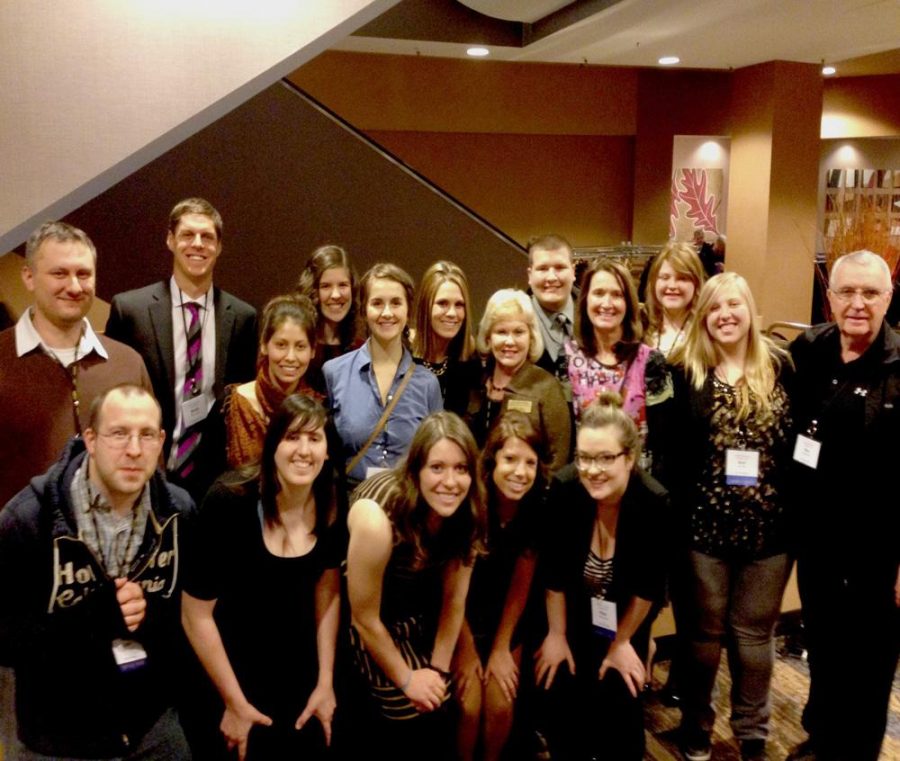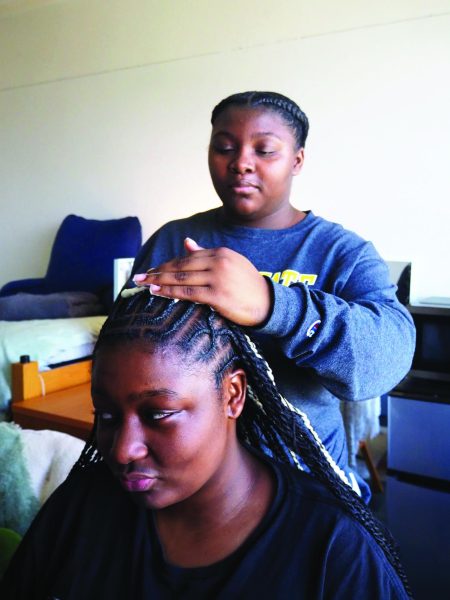WSC students present research in Minneapolis
Students from the communication arts department went to Minneapolis this past week for the Central States Conference, where they sat on panels and presented research papers
April 14, 2014
Fifteen students from the WSC communication studies program presented their research at the 83rd annual Central States Communication Association Convention in Minneapolis last week.
Only 43 percent of all the research submissions throughout the nation were accepted to this year’s conference. Dr. Deb Whitt and Dr. Randa Garden both integrated the theme of the conference, “Elevate,” into the title of their student research panels to capture the essence of the students’ papers.
Seniors Keely Odell, Riley Dohmen, Francys Chavez and juniors Alyssa Bish, Miranda Schnebel and Taylor Worden presented five papers on the panel, chaired by Garden. Their papers were the result of original research they did in their Qualitative Research Design class with Garden.
Odell presented her paper, “Uplifting Spirits: A Narrative Inquiry on the Emotional and Communicative Benefits of Owning a Service Dog.”
Dohmen presented, “Abby’s Story: A Daughter’s Journey of helping her Mother Rise above the Ravages of Drug Addiction.”
Chavez and Bish presented their paper, “Elevating Family Communication across Borders: A Narrative Inquiry.”
Schnebel presented her paper, “Nobody Fights Alone: The Story of how Unbroken Support can elevate the Spirits of a Young Boy with a Brain Tumor.”
Worden presented her paper entitled, “The Story of how Compassion and Caring Communication can Elevate Adam’s Spirits through Each Stage of Recovery from Leukemia.”
Using a narrative inquiry approach by Clandinin and Connelly (2000) as a guide, the students captured the detailed stories of a single person who could shed light on the phenomenon they were studying.
Next, they analyzed the participants’ experiences and “restoried” them into a chronological sequence. So the final study write-up is a collaboration between the researcher and the participant. Timothy McKenna- Buchanan, a doctoral candidate at Ohio University and former communication studies graduate at Wayne State was the respondent for the panel.
“The presentations were exceptional,” Whitt said. “I couldn’t be more proud of the communication students and faculty.”
Senior Chavez, juniors Lindsey Milburn, Robbie Hall, Jennine Kottwitz, Ashley Tompkins, Abby Schademann, Bish and sophomore Blake Hughes presented five papers, chaired by Whitt. Their papers were the result of original research they did in their Family Communication class taught by Whitt.
Chavez and Tompkins presented, “Family Communication Patterns after Relational Transgressions.”
Milburn and Hughes presented, “Applying Communication Privacy Management Theory to Families with Alcoholic Mothers.”
Hall and Kottwitz presented their paper entitled, “Communication Avoidance and the LGBT Family Member.”
Schademann presented her paper, “Family Communication Post Type I Diabetic Diagnosis.”
Bish presented, “Communication Patterns within a Foster Family.”
The students each used a theoretical framework to analyze the complex communication issues experienced by families as they go through transitions in their lives.
Dr. Jeffrey Child of Kent State University and former communication studies graduate was the respondent for the panel.
Senior Brody Rohach and Junior Kori Witt also presented their research and creative poster in the Undergraduate Honors Research Poster Session I.
“Presenting their research projects legitimizes their hard work,” Assistant professor Rich Murphy said. “The conference energizes them. It reminds them why they do what they do.”
Their paper, entitled “Relational Confirmation,” was the result of a special project under the direction of Murphy. Rohach and Chavez presented in a panel entitled, “Elevating Undergraduate Student Participation – The Tell-all Session.” In this round table discussion, Rohach, Chavez and five other students from across the country presented on why they participate in classroom discussion and provided tips on how professors might get the most out of their students.
Murphy presented his work on a panel entitled “Elevating the Basic Course: Strategies for Promoting, Advancing and Strengthening Our Campus Presence.” In that panel, Murphy discussed strategies to improve interdisciplinary communication on campus, improve student retention, and publicize the accomplishments of the communication department.
In addition, Dr. Ron Whitt was a respondent for the Undergraduate Honors Research Poster Session II, and Garden chaired and responded in a panel entitled, “Defining Moments in Health Communication: The Journeys, Turning Points, and Narratives that Surround Our Research.”
The WSC students not only presented at the convention, but explored Minneapolis as well.
They visited the Mall of America and Gold Medal Flour Museum, which was the location of the CSCA President’s Reception. While touring the museum, attendees learned about the interesting history of the Midwest and how Minneapolis grew to be the main supplier of wheat products and largest grain processing center in the world.
The students attended various luncheons such as the Hall of Fame Awards luncheon and the President’s Undergraduate Honors Awards Luncheon where the WSC students were honored for their research.
Students also enjoyed dancing Saturday night at the Vice President’s CSCA Reception held in the Northstar Ballroom at the Hyatt.
The mission of CSCA is “to unite and educate people with both an affinity to the central region of the United States and a scholarly interest in all areas of communication for promotion of their mutual goals and advancement of their field.”









